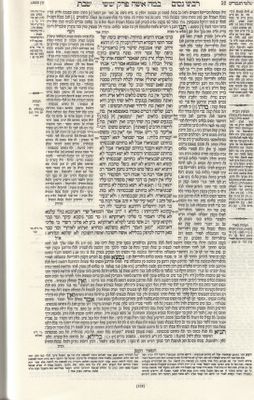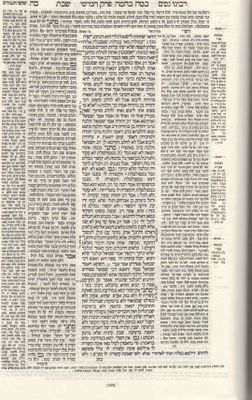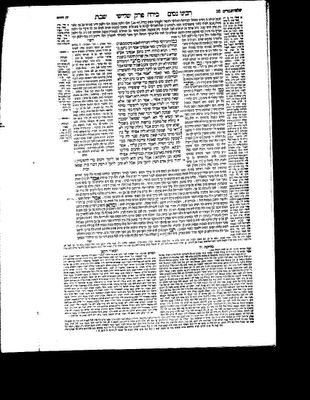
HIDE/SHOW IMAGE
27a
{Shabbat 59b continues}
Rav Shmuel bar bar Channa said to Rav Yosef: You explicitly told us in Rav's name that a coronet is permitted.
They told Rav: A great, tall, and lame man - and who is he? Levi, as we have said {Succah 53a} Levi demonstrated kiddah bowing {before Rabbi} and became lame as a result - has come to Nehardea, and has lectured: A coronet is permitted.
And so is the halacha.
The explanation of niska {in our gemara, אניסכא - which Soncino renders "cast metal"} is a thread of silver or of gold - that is to say, they are strips with holes, and they {machnisin} enter into them a thread to support them.
The explanation of rokta {our gemara: ארוקתא - which Soncino rendered "embroidered stuff"} - as the cloth, that those strips {of silver or gold} are affixed on the cloth.
Rav Yehuda cited Rav Sheshet {our gemara: Rav Shmuel}: A girdle [kamra] is permitted.
{Rashi: Kamra was a costly girdle, made either of solid gold or of cloth adorned with gold and precious stones}
And this is a girdle for the loins, and there were strips affixed, such as kalila {coronet, mentioned above} .
Some say {that the definition of kamra} is of ארוקתא - and Rav Safra said: It may be compared to a robe shot through with gold. {There is no fear of either being removed.}
And some say it is of אניסכא - and Rav Safra said: It may be compared to a royal girdle. {Which was likewise made of beaten gold}
And all Israelites are the sons of kings.
And since of אניסכא is permitted according to the second version, it would certainly be so of ארוקתא -- and the halacha is like the second version.
Rav Ashi said: As for a piece of a garment, if it has fringes, it is permitted; {For by their means it can be firmly tied to the wearer, so that it will not fall off and necessitate its being carried in the street.} if not, it is forbidden.
"NOR WITH A KATLA, NOR WITH NEZAMIM":
What is a KATLA?
A trinket holder. {Soncino: A band or necklace on which beads, trinkets, etc., are suspended}
And its name in Arabic is mechanka.
And what are NEZAMIM?
Nose-rings.
"NOR WITH A FINGER-RING THAT HAS NO SIGNET":
This [implies that] if it has a signet, she is liable a sin-offering.
And so is the halacha.
{Shabbat 60a}
"NOR WITH A NEEDLE WHICH IS UNPIERCED":
What is it fit for?
Rav Acha {our gemara: Adda} of Naresh interpreted it before Rav Yosef: Since a woman parts her hair with it, [it is ornamental].
And on Shabbat, what is it fit for?
They learnt {in a brayta - meanwhile, our gemara has this statement by Rabba}: It has a golden plaque at the end thereof: on weekdays she parts her hair therewith, [while] on Shabbat she lets it lie against her forehead.
MISHNA:
A MAN MAY NOT GO OUT WITH A NAIL-STUDDED SANDAL, NOR WITH A SINGLE [SANDAL], IF HE HAS NO WOUND ON HIS FOOT;
NOR WITH TEFILLIN, NOR WITH AN AMULET, IF IT IS NOT FROM AN EXPERT {or as we have it, that is not EXPERT}, NOR WITH A COAT OF MAIL [SHIRYON], NOR WITH A CASQUE [KASDA], NOR WITH GREAVES [MEGAFAYYIM]. YET IF HE GOES OUT, HE DOES NOT INCUR A SIN-OFFERING.
Gemara:
"A NAIL-STUDDED SANDAL":
What is the reason not?
Rav Abba cited Shmuel {in our gemara, just Shmuel}: It was at the end of the period of persecution






















